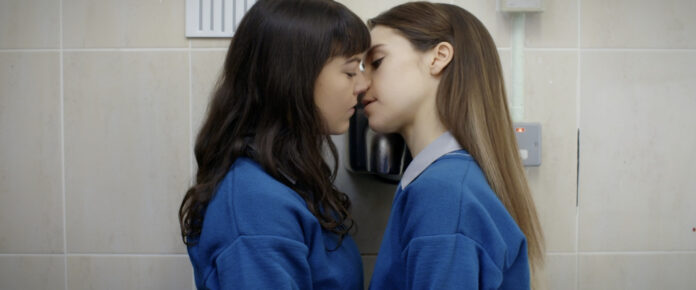The appealing Irish teen coming-out film, “Who We Love,” now available on VOD, seeks to empower young viewers with its salient messages about being — and not hiding — who you are. The film, co-written and directed by Graham Cantwell, and expanded from his 2016 short, “Lily,” also addresses the issue of queer bullying in sometimes heavy-handed ways.
Lily (Clara Harte, reprising her role from the short), has just returned to school in Ireland after spending the summer in San Francisco. She is starting to acknowledge her same-sex attraction, but has not told Simon (Dean Quinn), her out-and-proud best friend. Lily would rather make furtive glances at her classmate, Violet (Venetia Bowe), in the locker room than declare her feelings openly.
Everything changes, however, when Lily and Violet are caught kissing in the school bathroom. Violet claims Lily came on to her and hits Lily in an act of violence. A classmate’s social media blast outs Lily, who becomes distraught. Simon comes to her rescue, taking her into the city to meet Oonagh (Amy-Joyce Hastings) who can help Lily process her feelings and fears. Oonagh’s advice, about taking her pain and being aggressive, and finding an ally (like Simon) are useful, and Lily does take these messages to heart. Lily also connects with AJ (Amy Hughes) at a party Simon takes her to, which helps Lily embrace her sexuality.
“Who We Love” is strongest when it depicts the LGBTQ+ network that Simon introduces Lily to throughout the film. The discussions about how “it gets better,” as well as questions Lily has about happy queer people and couples (or the lack thereof) may feel didactic, but they are important lessons for a newly out teen.
Lily is afraid to come out to her parents, Dermot (Paul Ronan) and Yvette (Aisling O’Neill). She also has concerns about Violet and returning to school. A subsequent encounter Lily has with Violet provokes another attack, and while the incident is filmed, and Lily is bruised, she does not talk with her teachers or tell her parents; she wants to handle the issue on her own. Simon again assists her by taking Lily to an LGBTQ+ center where she hears other stories, such as one Naomi (Danielle Galligan) tells about her father’s reaction to her being gay that upsets Lily.
Cantwell’s film certainly has good intentions, and it is important to see Lily deal with her emotions at her own pace. However, there are scenes of both self-harm and suicide that should be addressed more seriously. Lily is struggling, and while Simon’s and Oonagh’s efforts to help her are useful, the film should do better in depicting the real needs of queer teens who are bullied and/or suicidal.
As the story plays out, the central issue of bullying also feels inadequately handled. Although it may be realistic that Violet acts out both physically and verbally as a form of self-loathing, her bad behavior seems absolved in a curious exchange she has with her mother (Norma Sheahan). And while Lily may find a way to respond to Violet, it involves threatening her and the use of a weapon. Cantwell seems to be sending mixed messages, here, advocating a stop-gap response rather than addressing the real problem head-on. The episodes of Lily being abused are hard to watch, which makes skirting the issue rather troublesome.
As Lily, Clara Harte makes her character sympathetic. She is like a sponge, absorbing all of Lily’s pain, but also soaking up all the information she gathers, too. Harte makes viewers feel the weight of Lily’s internalized emotions and it is easy to root for her even when she makes poor choices.
Likewise, Simon is an engaging character with his own arc. He is quite outspoken, cheekily asking about gay sex education in a health class, but he also has a strained relationship with his father, Fran (Jimmy Smallhorne). While an interesting scene has Fran admonishing a passenger who is bullying a gay man on the bus he drives, Fran appears to be only tolerant of his gay son, questioning how Simon dresses and who his friends are. After Simon suffers a setback, it provides an opportunity for father and son to confront each other and resolve their differences, even if it feels a bit pat.
“Who We Love” has its teen characters experiencing big, intense emotions as Lily and Simon are knocked around by life. They are treated poorly by some folks and tenderly by others, but the two queer friends also fight with each other. Cantwell certainly has affection for his characters as he puts them through the emotional wringer. But over the course of a few days, Lily and Simon’s lives feature so much drama, it becomes exhausting for both Oonagh, who complains as much, and possibly viewers.
Despite its flaws, “Who We Love” does have some very sweet moments, such as one of Simon delivering a moving speech to a moody Lily to win her over. Dean Quinn plays Simon with the right amount of attitude, leaning into stereotypes at times but never overplaying it. His story is a nice counterbalance to Lily’s and shows that queer teens may have problems, but they can also develop tremendous self-worth. That message is the film’s biggest takeaway, and what gives the well-meaning “Who We Love” its value.

